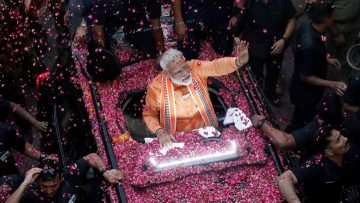Jonah Blank at The Atlantic:

The term Hindutva can be (sort of) translated as “Hindu-ness,” and that gets (sort of) at what it’s all about: Hinduism not a theology, but an identity. The movement’s intellectual father, Veer Savarkar, wrote its foundational text (helpfully titled Hindutva) a century ago. At the time, the notion of a unified faith or doctrine, let alone a shared identity, would have left most Hindus simply confused: Identity was determined by a person’s family, village, caste. The very term Hindu is merely a loanword (most likely from Persian), referring to “the people who live across the Indus River.” Until the 20th century, most Hindus had never felt the need to describe themselves in any comprehensive way.
It was the colonial experience that created Hindutva: Why, Savarkar and his comrades wondered, had India been dominated for centuries by a relatively small number of Muslim Mughals and Christian British? Was monotheism simply better suited for ruling? If so, what did that mean for a faith with more deities than days in the year?
more here.
